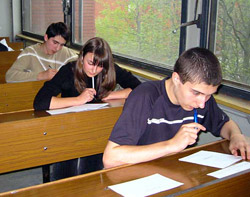This year university admission exams in Armenia were known for the low exam scores, especially the general subjects. There are a few explanations for this.
1. Applicants hadn’t prepared well enough (I saw how the applicant couldn’t even answer basic questions about, for example, Russian language, Armenian language and literature).
2. The tests included topics that the students haven’t studied in school. Both the applicants and tutors assure that. (it’s evident that the students from the regions with not enough money to take tutoring score low on the exams, usually in biology, chemistry, physics and mathematics).
3. The members of the subjective committees are not that professional (tutors claimed that after seeing how poorly committee members came up with arguments).
4. The method of evaluation is wrong and unclear (the complaints mainly concern Armenian history, world history and creative contest subjects).
Applicants wouldn’t worry over the low scores if it weren’t for the increase in high scores during the last days of exams (this has happened in the past when the low scores gradually went up).
“We expect to see higher scores during the last days of the exam because on the last day, we no longer have applicants who just came to an exam. Besides that, applicants are more prepared, they have some experience already and can handle it,” said head of the Creative Contest subjective committee Artsrun Avagyan.
August 3rd marked the last day for this exam and despite Avagyan’s predictions, there weren’t any high scores. The highest score was 16 and only one out of 110 applicants got that. The rest failed. There were six arguments on the first day of the exam, of which only one score was raised by half.
“The quality is low. Applicants have memorized the essays, they make spelling and punctuation errors, they don’t write a lot, get off topic and don’t have any creativity,” says A. Avagyan. The exam took four hours and the applicant was supposed to write his thoughts on four pages. However, very few were able to complete the assignment.
The lack of creativity is a result of less reading. The memorized essays mean that the applicant neither has logic nor imagination. According to Avagyan, the tests for Armenian language are to blame because they don’t test the knowledge of students, but rather show how to take tests.
“The applicant doesn’t know correct spelling and punctuation. The tests don’t show the person’s individuality,” says Avagyan. He says that the committee didn’t find one essay where the applicant’s thoughts and creative mind helped set aside the spelling errors and raise the score.
“One of the points of the evaluation system states that if the applicant’s essay is good and he/she has creativity, then the score may go up three more points despite the number of spelling and stylistic errors that there may be,” says A. Avagyan.
However, this was not the case this year. There were only some essays that got one more point for being more or less interesting. An essay is a “type of work”, which requires subjectivity and the same essay may be graded differently by different professors, starting from unsatisfactory to excellent (this refers to the creative work and not the spelling and punctuation errors). How can you grade an essay written by an applicant who writes about any topic based on the mood he is in? On one of the exam days, the applicants were assigned to write an essay about an “Art Exhibition” (what a topic). One girl decided to start her essay the following way:
“Yesterday my sister and I went to an art exhibition where I met the guy that I like…”
The essay went on to tell about the boy, who had come to the exhibition and was the, shall we say, most interesting “canvas” on display. Can we consider this an interesting, creative approach or simply a violation of rules? I can imagine how creative the applicant must be to compare the canvas with her beloved. However, the committee members were probably more pragmatic and graded that essay unsatisfactory. Perhaps for them there is a difference between the canvas and the human being. Perhaps you can’t really think about love at an art exhibition, or picture a person instead of a canvas, in this case the beloved. You simply have to look at the paintings and write about the flow of the river, the fluttering of the waves and the chirping of birds…
P.S. Some professors say that in some cases, the applicant studies, or better yet, memorizes only one topic-“My Homeland” or “My first love”-and writes whatever he remembers. Professors understand this cleverness and that’s why they demand the applicants to write the essay based on the requirements.

